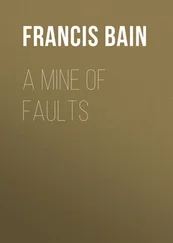Francis Bain - The Ashes of a God
Здесь есть возможность читать онлайн «Francis Bain - The Ashes of a God» — ознакомительный отрывок электронной книги совершенно бесплатно, а после прочтения отрывка купить полную версию. В некоторых случаях можно слушать аудио, скачать через торрент в формате fb2 и присутствует краткое содержание. Жанр: foreign_antique, foreign_prose, на английском языке. Описание произведения, (предисловие) а так же отзывы посетителей доступны на портале библиотеки ЛибКат.
- Название:The Ashes of a God
- Автор:
- Жанр:
- Год:неизвестен
- ISBN:нет данных
- Рейтинг книги:5 / 5. Голосов: 1
-
Избранное:Добавить в избранное
- Отзывы:
-
Ваша оценка:
- 100
- 1
- 2
- 3
- 4
- 5
The Ashes of a God: краткое содержание, описание и аннотация
Предлагаем к чтению аннотацию, описание, краткое содержание или предисловие (зависит от того, что написал сам автор книги «The Ashes of a God»). Если вы не нашли необходимую информацию о книге — напишите в комментариях, мы постараемся отыскать её.
The Ashes of a God — читать онлайн ознакомительный отрывок
Ниже представлен текст книги, разбитый по страницам. Система сохранения места последней прочитанной страницы, позволяет с удобством читать онлайн бесплатно книгу «The Ashes of a God», без необходимости каждый раз заново искать на чём Вы остановились. Поставьте закладку, и сможете в любой момент перейти на страницу, на которой закончили чтение.
Интервал:
Закладка:
And then at last, being pleased with his perseverance, such as it was, I appeared to him one day in the guise of a digambara ,[ 19 19 i. e. a naked mendicant ascetic.
] and granted him a boon. Thereupon that indomitable Trishodadhi replied: O Shankara, I ask for absolutely nothing, but permission to continue my devotions. If therefore I must perforce select a boon, grant me as much time as I require, so as to continue, muttering on, till I abandon my assiduity of my own accord. So I left him, muttering diligently away, just as before, though I foresaw the end, and knew that he carried within him, unsuspected by himself, the seed of the fruit of his own undoing, which time would ripen, dooming him to undergo the punishment that lies in wait for all, who plunge, without due consideration, into enterprises above their strength.[ 20 20 Nemo potest supra seipsum , said the Schoolmen – a profound observation exactly in harmony with old Hindoo ideas on moral force.
] And so the boon I offered him was wasted, and the chance was thrown away. For had he only had knowledge of himself, it might have saved him after all, by ensuring him oblivion of the past. For his memory was his ruin, as the story will show thee, O Daughter of the Snow.
And he in the meantime muttered on unflaggingly, wholly intent on nothing else, till at length the mound of his accumulated merit began to rival in dimension yonder hill, whose top the evening sun is now touching with the colour of affection, as if loth to leave it to be swallowed by the dark.
And then at last one day it happened, that Mátali arrived in Indra's palace, having returned to heaven from a visit to the earth. And as soon as he entered, he exclaimed: O punisher of Páka,[ 21 21 i. e. Indra. Mátali is his messenger, the Hindoo Mercury.
] and the rest, what are you all about? Are you asleep, or have you actually abandoned all care whether of your own pre-eminence or the established order of the world? For away below on earth, there is an old Brahman, in a deserted cemetery in the forest of the Windhya hills, who by his interminable muttering continued through the centuries has accumulated so gigantic a heap of merit,[ 22 22 This singular idea, familiar now to Europe, in the form of the prayer-wheels of Tibet, is not wholly without parallels in the West. The only difference is, that the Hindoos are a very logical people, and carry the absurd to its extreme.
] that it threatens destruction to the three worlds. And now, unless something is done very speedily to stop him, and reduce it, this merit of his, beyond a doubt, will disturb the equilibrium of the universe, and wreck the established order of the worlds, and hurl you from your thrones.
And hearing him, Indra said: There is no difficulty in this. I will go myself, and bribe him to discontinue his proceedings. And he went down himself accordingly to earth, to examine and investigate that Brahman, and see what could be done. And after considering him awhile, and admiring his extraordinary obstinacy, he set to work to tempt him, and induce him, by offering bribes of various descriptions, to desist. And he offered him accordingly mountains of gold, and oceans of jewels, and everlasting youth, and many kinds of magic power, and finally he racked his brains, to find something or other that would move that obdurate Trishodadhi, and draw him from his vow. But in vain. For Trishodadhi paid no more attention to his offers and himself, than the moon does to the barking of a dog; continuing to mutter, all the time he spoke, just as if he was not there.
So finding all his efforts vain, after a while, that baffled lover of Ahalyá[ 23 23 The wife of the sage Gautama, with whom Indra had an intrigue that covered him with shame, in more ways than one.
] returned to heaven. And summoning the gods, he laid the case before them, and requested their advice. And after deliberation, they determined to seduce him by sending down a heavenly nymph, saying to themselves: Did not Menaká, and Tilottamá, and others of their kind, prove too strong for the asceticism of even mighty sages, so that their merit melted, like a lump of snow, in the flame of their desire, and their self-control vanished like stubble in a forest conflagration? Nay, did not even Brahma assume his name,[ 24 24 Chaturmukha .
] becoming four-faced, in order to gratify his intolerable thirst to behold the beauty of Tilottamá performing a pradakshina around him, though he would not turn his head? Therefore it is not to be doubted that in this case also, the irresistible amber of feminine attraction will prove its power, and draw this grass in the form of a Brahman any way it will, snapping like thread the resolution which would chain him to his muttering, as soon as it is seen.
And accordingly they drew up before them in a row the chorus of Indra's heavenly dancers. And they chose out of them all that Apsaras who seemed to them the least easily to be resisted, by reason of her rounded arms and dainty ankles, and sent her down to earth with suitable instructions, to seduce that Brahman from his muttering as quickly as she could. But she, to her amazement, found on her arrival, that, do what she might, she could not even so much as succeed in inducing him to look at her sideways even for a moment. So, after a while, she left him, and flew back to heaven in a pet. And they sent instead of her another, who presently returned, having found herself as ineffectual as the first. And they tried again, and sent, one after another, the whole of Indra's chorus, pelting as it were that stony-hearted old ascetic with a very shower of celestial flowers, and gaining the very opposite of the end at which they aimed. For inasmuch as he never ceased muttering even for a moment, all their efforts to corrupt him and reduce his stock of merit only added to its heap, making its mountainous proportions more formidable than before.
And finally Indra exclaimed in despair: We are conquered by this awatár of obstinacy in the form of an ascetic, on whose rock the waves of this very sea of beauty beat in vain. And now there is no refuge for us but in the sole of the foot of the Burner[ 25 25 i. e. Maheshwara himself, who burned Love with fire from his eye.
] of the Bodiless God. For he alone is stronger than Love, whose power seems to fail us in this pinch, rendered nugatory by the intractable composition of this exasperating mutterer. And if even he can devise no remedy for this disease, it is incurable; and then will this incorruptible old devotee have us all at his mercy,[ 26 26 Max Müller, to whom students of the Rig-Weda owe so much, was nevertheless essentially mistaken in saying that the word weda means knowledge . It does not mean knowledge, in our sense of the word, scientific, Baconian, Aristotelian; an idea quite alien to that of the old hotris . By weda they meant magical knowledge , spells ; which being sung or muttered had power to compel the deities: thus the Brahman who possessed the "knowledge" (in the phrase of the Brahmanas, yah ewam weda ) was the master of the world.
] and bring heaven to its knees, and turn, if he pleases, the three worlds upside down.
And then, led by Indra, they came altogether in a body to me; and placing the difficulty before me, they waited with anxiety to hear what I should say. And I looked there and then into the future, and saw in its dark mirror, like a picture, the ruin of that old ambitious Brahman, and the means by which it was destined to be accomplished. And after a while, I said slowly: All diseases are not able to be remedied by the same medicine, and notwithstanding the omnipotence of feminine attraction, this is a case wherein heavenly nymphs are impotent, and utterly without avail. For all these heavenly nymphs do nothing but dance and sing and attitudinise and ogle, imagining that as in the case of Menaká Tilottamá, Rambhá, and the rest, they have only to show themselves to gain at once their end, trusting only to the body and its beauty, and very shallow coquetry and artifices to sharpen the edge of its effect, such as wind that stirs their clothing, or water that causes it to cling to the outline of their limbs and reveal, as if by accident, the thing that it pretends and is intended to conceal, and other such devices. But this Trishodadhi is a fish that, as I perceive, will not easily be caught by the bait of mere meretricious beauty, and in his case, the hook must be hidden in a lure of quite another kind. But there is a Daitya, named Aparapaksha,[ 27 27 i. e. the dark half of the lunar month.
] living at the very bottom of the sea, who has a hundred daughters. And were beauty the necessary weapon in this instance, any one of them would serve the turn, since all of them have bodies formed as it were of ocean-foam, with lips of coral, and eyes like pools, and hair longer than themselves, and voices like the echo of the waves; and only lately I heard them singing all together as I passed, on an island shore, and was myself all but bewitched, so that unawares I paused, hanging in the air to listen, waylaid as it were by the magic and the spell of that melancholy sound, forgetting my journey for the sake of their refrain. But now, since something more is necessary, you must abandon all the others, and betake you to the youngest of them all, who is rightly named Kalánidhi, though she is the ugliest and cleverest woman in the three worlds, for she is a very ocean of craft and trickery and guile,[ 28 28 There is a pun in her name, which as applied to the moon, means a store of digits , but also signifies an ocean of wiles .
Интервал:
Закладка:
Похожие книги на «The Ashes of a God»
Представляем Вашему вниманию похожие книги на «The Ashes of a God» списком для выбора. Мы отобрали схожую по названию и смыслу литературу в надежде предоставить читателям больше вариантов отыскать новые, интересные, ещё непрочитанные произведения.
Обсуждение, отзывы о книге «The Ashes of a God» и просто собственные мнения читателей. Оставьте ваши комментарии, напишите, что Вы думаете о произведении, его смысле или главных героях. Укажите что конкретно понравилось, а что нет, и почему Вы так считаете.












